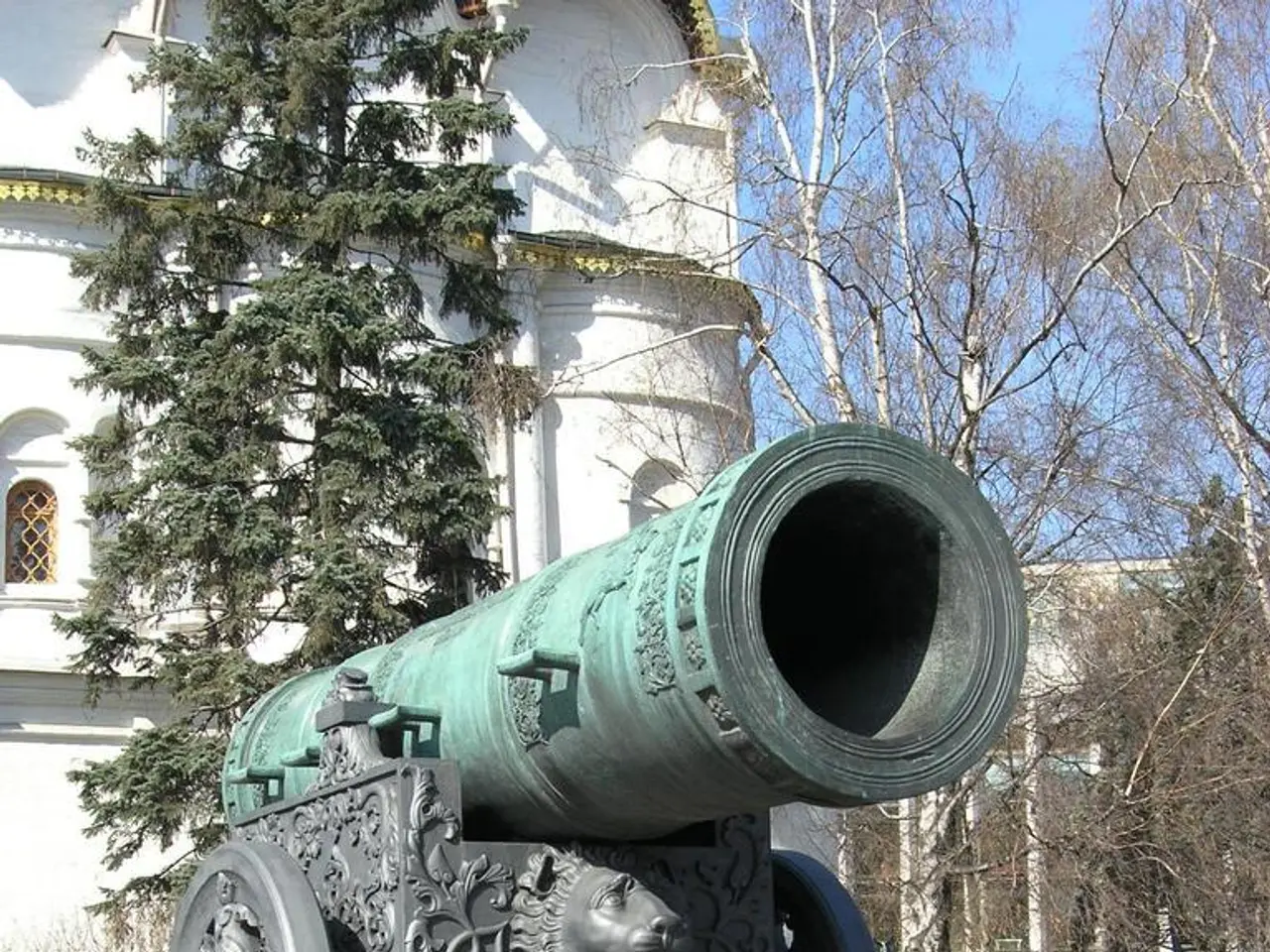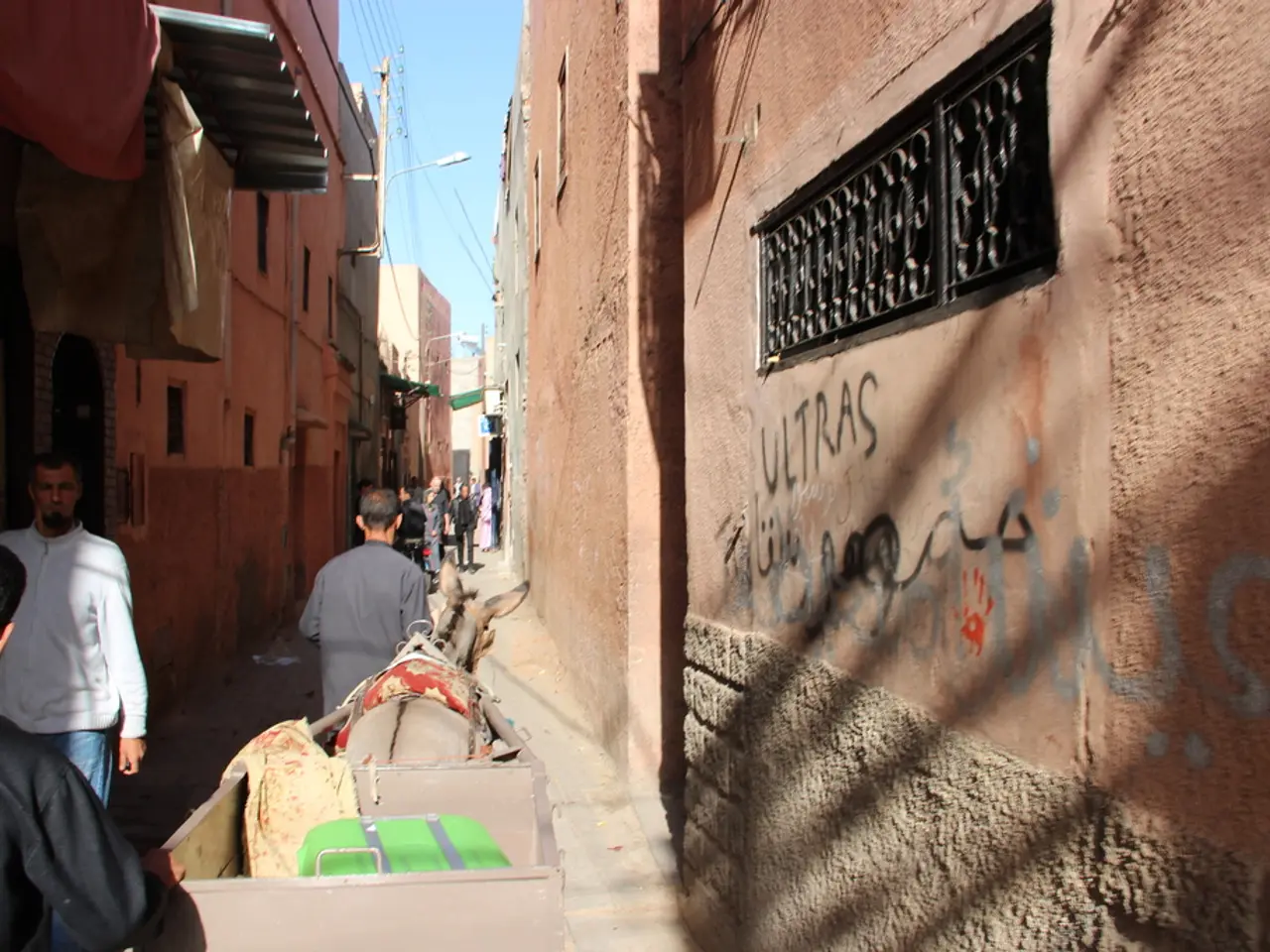Stepping Off the Cliff: Russia's Economic Tumble into Recession
Russia teeters on the edge of economic downturn, according to the Minister's declarations.
It's the elephant in the room that everyone's whispering about - Russia might be careening towards a recession, according to none other than Russia's Economy Minister himself. Maxim Reshetnikov dropped this unexpected bombshell at the St. Petersburg International Economic Forum.
Russia's economy hasn't looked this shaky since the war began. To be clear, the nation's war industry is firing on all cylinders, propping up the economy. But beneath the blaze of artillery, cracks are starting to form.
Rising Red Flags
Reshetnikov confirmed the fear, stating, "Based on the current business sentiment and economic indicators, it seems we are already on the brink of a recession." To counter the slowdown, Russian authorities cut interest rates this month, reducing borrowing costs from a staggering 21 percent to a still formidable 20 percent.
Despite the rate reduction, Russian companies have been complaining about these high interest rates, which have hindered investments and slowed economic growth.
Central Bank Chief Elvira Nabiullina sees the slowdown in economic growth as "a way out of overheating." The bank predicts that the economy will grow at a painfully slow pace of 1-2 percent in 2025, a drastic drop when compared to 2024's impressive growth rate of 4.3 percent.
However, Nabiullina also warns that challenges lie ahead. In her words, "We must understand that many of these resources have actually been depleted, and we need to think about a new growth model."
Compounding Concerns
Many companies outside the defense industry are facing their own set of problems. High personnel costs, due to labor shortages, are being passed onto customers. Add to that the burden of burdensome interest rates, significantly increasing the cost of borrowing, and you've got a recipe for disaster.
The central bank counters this, stating that most industries are generating enough profits to finance investments. But the question remains - for how long?
The Storm on the Horizon
Economic forecasts for Russia suggest significant headwinds and the growing risk of recession in 2025. The country is grappling with soaring budget deficits, rising inflation, declining real incomes, and increased war-related expenditures. Long-term loans now carry real interest rates as high as 40 percent, adding strain to the economy.
Inflation is accelerating, reaching the Bank of Russia's projected 7-8 percent and some analysts projecting actual annual inflation to be between 15-21 percent. Real incomes are forecasted to fall by at least 2 percent, with food prices potentially rising by 20 percent. Personal bankruptcies have increased by a staggering 35 percent.
The labor market is also struggling, with a growing labor shortage nearing the 3 million mark. Retail sales growth is over three times slower than income growth, despite official increases in real incomes. The mortgage market is also taking a hit, with mortgage loans issued in March 2025 being half that of March 2024.
A Dire Outlook
Russia's economic prospects in 2025 are looking grim, with multiple macro indicators signaling an imminent recession. The combination of reduced oil revenues, increased war spending, and persistent sanctions are making matters worse. The overall outlook is pessimistic, with analysts predicting a structural collapse in some sectors and widespread business struggles.
Sources: ntv.de, lar/rts/dpa
- Russia
- Recession
- Economic Forecasts
Enrichment Data:Current economic forecasts for Russia point toward significant headwinds and growing risk of recession in 2025, driven by a combination of soaring budget deficits, rising inflation, declining real incomes, and mounting war-related expenditures.
Key Forecasts and Economic Indicators
- Budget Deficit: In 2025, Russia has tripled its official budget deficit forecast, now projecting a deficit of 3.8 trillion rubles (about $49.4 billion), which is 1.7% of GDP and the country's second-largest in nominal terms since the pandemic.
- Oil and Gas Revenues: These revenues, traditionally Russia’s fiscal backbone, have been slashed by 2.6 trillion rubles (about $33.8 billion) due to lower global oil prices and a stronger ruble.
- Borrowing and Wealth Fund Use: The government plans to dip into the National Wealth Fund if revenues fall below baseline, with 447 billion rubles (about $5.8 billion) earmarked for this purpose. However, officials are keen to conserve the fund’s liquid reserves, currently at 2.8 trillion rubles (about $36.4 billion).
- Inflation: The government raised its forecast for consumer price growth from 4.5% to 7.6% for April 2025. The Bank of Russia now expects inflation to reach 7–8% by year-end, with some analysts projecting actual annual inflation between 15% and 21%.
- Income and Living Standards: Real incomes are forecasted to fall by at least 2% in 2025, with some experts warning the actual decline could be much steeper. Food prices may rise by 20%, and personal bankruptcies have increased by 35%.
- Labor Market and Consumer Activity: The country faces a growing labor shortage, nearing 3 million people. Retail sales growth is over three times slower than income growth, despite official increases in real incomes. The mortgage market is also taking a hit, with mortgage loans issued in March 2025 being half that of March 2024.
- Structural and Macroeconomic Pressures: Real interest rates for long-term loans are as high as 40%. The combination of rising deficits, soaring inflation, falling real incomes, and structural economic problems significantly raises the risk of recession in 2025.
- Economic Outlook: The overall outlook is pessimistic, with analysts highlighting a structural collapse in some sectors and widespread business struggles.
Summary Table: Key Forecasts
| Indicator | 2025 Forecast/Estimate ||--------------------------|------------------------------|| Budget Deficit | 3.8 trillion rubles ($49.4 billion), 1.7% GDP || Oil/Gas Revenue Shortfall| -2.6 trillion rubles ($33.8 billion) || Inflation (official) | 7–8% (Bank of Russia), up to 21% possible || Real Income Change | -2% (official), steeper declines likely || Food Price Increase | up to 20% || Personal Bankruptcies | +35% || Labor Shortage | ~3 million || Mortgage Loans (March) | Halved vs. 2024 |
- The ongoing economic concerns in Russia, as forecasted, show a significant risk of recession in 2025, with major economic indicators such as budget deficits, inflation, declining real incomes, and a growing labor shortage all pointing towards this possibility.
- The discussion about Russia's economic future in the political and general-news spheres has extended to various policies, including the community policy and employment policy, as authorities grapple with the challenges resulting from the potential recession and the need to find new growth models.






